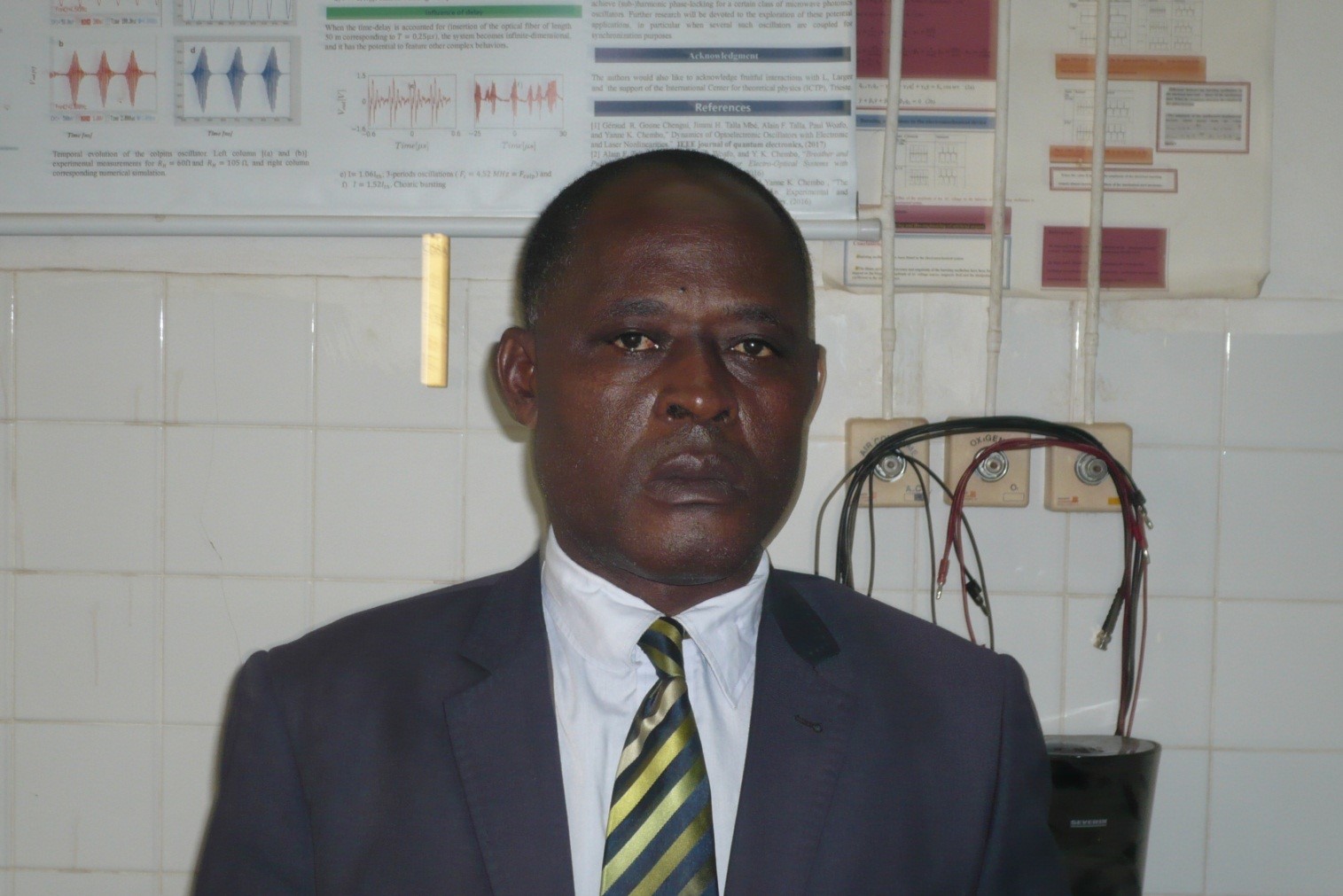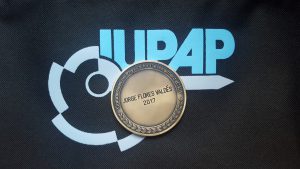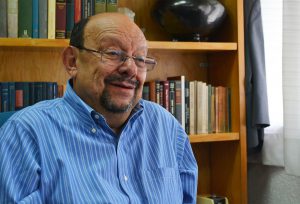
C13: News
2020 IUPAP MEDAL FOR OUTSTANDING CONTRIBUTIONS TO THE ENHANCEMENT OF PHYSICS IN DEVELOPING COUNTRIES
Professor Paul WOAFO

Citation: For his many exceptional contributions to the development of physics in Cameroon and the African continent, including founding the Cameroon Physical Society, co-organizing several research collaborations between Cameroon and other countries, founding the Sci-Tech Service to facilitate research on topics of local development, and organizing a series of International conferences on applications of physics to real life problems in developing countries.
A dominant force in the promotion, development and applications of physics in Cameroon, and throughout Africa more generally, Paul Woafo has served on the faculty at the University of Yaoundé I in Cameroon since 1992, becoming Professor of Physics in 2005 and Director of the Laboratory of Modelling and Simulation in Engineering, Biomimetics and Prototypes. All his school education took place in Cameroon, from the primary level to the doctorate, and he defended his Doctorat 3ème cycle in 1992 and his Doctorat d’Etat in 1997. The main topic of the research for his two doctorates was the dynamics of short topological solitons in diverse materials, including ferroelectric materials, hydrogen-bonded materials, surfaces, and biological systems. During his career, Woafo has published some 250 articles in international refereed journals in various fields of fundamental and applied physics, including numerical simulations, experimental investigations, and realization of prototypes of devices for industrial, domestic and health uses (www.lamsebp.org).
Woafo is one of the major influences behind many Cameroonian physicists. He has supervised 53 Ph.D. theses and a large number of Masters theses. This supervisory dimension of Woafo’s work has spread to Benin, the Central African Republic, and outside Africa. Many of his former students have become highly respected physicists working in Cameroon and abroad, with a number attaining the rank of professor at their respective institutions. Much of this has been possible due to the many collaborations that Woafo has established with colleagues in other countries in Africa, Europe, the Americas, and Asia. These benefits have been through Ph.D. supervision, research visits, and postdoctoral appointments. All these research activities have helped Woafo to be admitted to prestigious institutions, such as the Abdus Salam International Centre for Theoretical Physics, where he was awarded the position of Associate Member; and the Alexander von Humboldt Foundation in Germany, where Woafo was accepted as a Humboldtian in 2007. He also served as a member of IUPAP’s C3 Commission on Statistical Physics.
Woafo has played a major role in founding a number of scientific organizations and other initiatives. In 2006, with six other physicists, he founded the Cameroon Physical Society, which was legalized by the Cameroon government in 2007. During its initial years from 2006 to 2013, Woafo headed the Society, which now counts more than 150 members. While managing the Society, Woafo engaged Cameroonian physicists to first organize a national conference in 2007 to improve the situation of physics in Cameroon. He then put in place a biennial international conference on Low-Cost High-Level Physics and Solutions to Real Life Problems in Developing Countries. This conference, which has been the only permanent meeting for physicists in Cameroon, has attracted physicists from different parts of the world, including Africa, the Americas and Europe.
Parallel to the Cameroon Physical Society, Woafo launched three Cameroonian Student Chapters related, respectively, to the Society for Photonics and Instrumentation Engineers (SPIE), Optical Society of America (OSA), and Institute of Electronic and Electrical Engineers-Photonics Society (IEEE). Through these chapters, Woafo has organized special training to empower graduate students and postdocs, not only in the main field of optics and applications, but also in embedded technologies, numerical simulation and career development.
As the Cameroon focal point of the 2015 International Year of Light, Woafo, together with Professor Yanne Chembo Kouomou, organized a workshop on research in optoelectronics, optomechanics, optical materials, nonlinear optics, optical telecommunications, and solar cells. The workshop was attended by some 100 participants from Africa, Europe, and Oceania. In other work, Woafo organized a meeting in 2017 entitled, Women in Photonics, to which more than 25 junior women physicists came from different Cameroonian universities to discuss issues related to photonics education and research and the difficulties faced by women engaged in hard science studies.
Highly sensitive to the lack of experimental training in secondary schools and universities, in 2013, Woafo created a private scientific center called Sci-Tech Services to promote experimental science, reinforce the capacities of scientists in several fields, and conduct technological research activities (www.sci-tech-services.com). This center has provided practical trainings for students, support to universities, and specialized training for Masters and Ph.D. students.
Due to the lack of scientific equipment in most of Cameroon’s universities and high schools, Woafo became the local organizer of Challenge for Experimental Physics in Africa. This competition is supported by the French Association pour la Promotion Scientifique de l’Afrique, Cameroon Physical Society, Cameroon Academy of Sciences, French Physical Society, and European Physical Society. The first edition culminated on December 8, 2017, with the awards presentation to four appropriate and inexpensive experimental instruments: a didactic bench for electricity and electronic experiments, physics lab incorporating the use of cell phone screens as oscilloscopes, special signal generator, and solar tracker. Details for this competition can be found at http://sfp.univ-lille1.fr/concoursphysiqueafrique.
Woafo was elected a Fellow of the Cameroon Academy of Sciences in 2006 and was charged with creating the Cameroon Young Scientists Academy, which officially launched in 2018. At the continental level, Woafo was one the founders of the African Physical Society in Dakar in 2010 and was elected as one of its Vice-Presidents. In science policy, Woafo has acted in several roles at the Ministry of Higher Education and the Ministry of Research and Scientific Innovation. Finally, Paul Woafo is often interviewed in newspapers, radio, television, and conferences on ways to optimally organize scientific activities in Cameroon and in the rest of Africa.
The IUPAP C13 Commission is proud to recognize the many achievements of Professor Paul Woafo by bestowing upon him its 2020 IUPAP Medal for Outstanding Contributions to the Enhancement of Physics in Developing Countries.
——————————————–
THE INAUGURAL IUPAP MEDAL FOR OUTSTANDING CONTRIBUTIONS TO THE ENHANCEMENT OF PHYSICS IN DEVELOPING COUNTRIES
 The inaugural IUPAP medal for outstanding contributions to the enhancement of Physics in Developing countries was presented to Dr Jorge Flores Valdés from Mexico. The medal was presented during the 29th General Assembly of IUPAP held in Sao Paulo, Brazil in October 2017.
The inaugural IUPAP medal for outstanding contributions to the enhancement of Physics in Developing countries was presented to Dr Jorge Flores Valdés from Mexico. The medal was presented during the 29th General Assembly of IUPAP held in Sao Paulo, Brazil in October 2017.Dr Jorge Flores Valdés

Dr. Flores is a towering figure in Mexican physics of his generation. He has excelled in all academic activities: research, teaching, outreach and the creation and consolidation of institutions. As a researcher he counts with many major contributions in nuclear physics, and as an important contribution he has the Brody, Flores et al. paper in Reviews of Modern Physics (1981) that has received close to 2,000 references in the specialized literature. He is one on the most motivating teachers I have heard and has directed 30 theses at different levels. Many of his students are now key players in Mexican science. He was one of the first important researchers that started emphasizing the importance of popularization and outreach at a time (the 1970s) where these activities were considered in Mexico more of a liability than an asset. He has give
In a large number of lectures and published several popularization books that have reached a vast nonspecialized audience. He was Director of the Institute of Physics of the National University of Mexico (UNAM) from 1974 to 1982, consolidating the role of this most important institution while performing as one of his most energetic and creative functionaries. After serving in this position, he accepted the position of Education Undersecretary in the Government of the Republic. Science in Mexico was then (1982) passing by a very difficult time; the salaries were very low and many young people was moving abroad or simply not returning to Mexico. Dr. Flores came with the key idea of creating a system of additional salaries for the most productive researchers. His idea was concreted in 1984 with the creation of the Sistema Nacional de Investigadores (SNI) by the President of the Republic. This initiative provides scholarships to scientists after a careful examination of their scientific achievements. The net result has been a substantial increase of the scientific production and saved science in Mexico. Now the SNI provides a complementary salary for nearly 15,000 researchers and helps to create much more attractive working conditions. In 1989, he accepted the compromise of starting inside the National University a science museum that could compete with private museums already working successfully in Mexico. He was the founder and first Director of the Science Museum “Universum” that continues operating inside the Mexico City facilities of UNAM and receiving tens of thousands of visitors every year. Decentralization was another key problem of Mexican science. Most of it was located in Mexico City. He was the founder and the first Director (1998) of the Center of Physical Sciences in the city of Cuernavaca, that later became the Institute of Physical Sciences of UNAM. Dr Flores has been recognized with all major Mexican awards, including the National Award of Sciences (1994). He continues his work as a persuading force in the world of Mexican physics, always trying to take it to higher levels. Those who have had the privilege of working and collaborating with him, acknowledge his vision and dedication and consider that Dr. Flores has played a most positive role in the development of physics in Mexico and is an excellent candidate for this major recognition. In addition to his contributions to the development of physics, Flores has performed high quality research in various fields, like nuclear physics, seismology, and the physics of elastic media.
————————————————————————————————————
 IUPAP: The International Union of Pure and Applied Physics
IUPAP: The International Union of Pure and Applied Physics